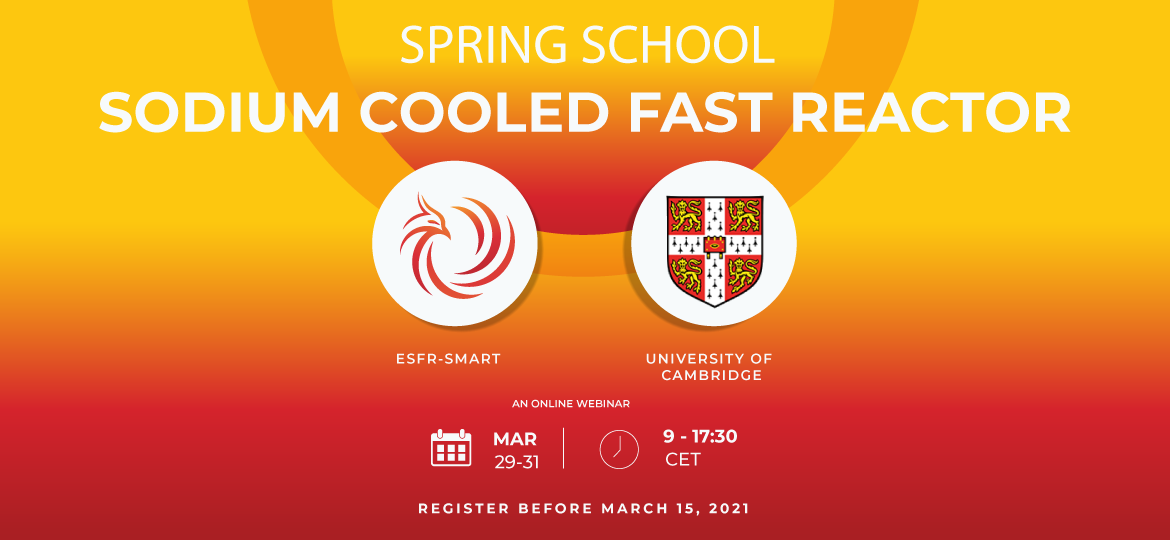
Hosted by the University of Cambridge, the Spring School will take place online March 29th-31st, 2021.
The Spring School on Sodium Cooled Fast Reactor is organized in the framework of the ESFR-SMART Project. An overview of the past, present, and future of the SFR projects will be given in the meeting, accompanied by short lectures on SFR fundamentals and highlights on the on-going R&D activities.
OBJECTIVES
The main objectives of the meeting are to help the young generation of researchers in the area to gain a deeper knowledge and expertise in various areas of SFR fundamentals (neutronics, thermal-hydraulics, materials, and safety) and few other GEN-IV reactors, and provide an opportunity for them to present their work in their relevant field and create a network to promote collaboration in the future.
To whom it is addressed
Masters and PhD students are the main audience for the meeting. Regulatory authorities, scientific and technical staff and young professionals are also welcome. The Spring School objectives will be achieved by means of talks and idea exchanges with specialists involved in R&D. The meeting language will be English.
topics
- Overview of SFR and other Gen-IV reactors
- Core neutronics and thermal-hydraulics
- Sodium bulk and molten pool behaviour
- Safety systems and accident mitigation
agenda
09:00 Welcome
09:10 Agenda of the Summer School
Session 1: Sodium Cooled Fast Reactor Overview (Past & Present)
09:20 Overview of FRs in the world & ASTRID project – Christian LATGÉ (CEA)
09:50 CP-ESFR & ESFR-SMART – Konstantin MIKITYUK (PSI)
10:10 PFR operational feedback – Tony JUDD
10:40 Break
11:00 EU GEN-IV activities – R.GARBIL / C. FERNANDEZ-RAMOS
11:20 IAEA GEN-IV activities – Vladimir KRIVENTSEV (IAEA)
11:40 OECD GEN-IV activities – Tatiana IVANOVA (OECD-NEA)
12:00 Panel Discussion
12:30 Lunch Break
Session 2: Educational Session (Lecture: 40’ + 10’ questions)
13:30 Self-Introduction of participants
14:00 Lecture 1: SFR fuel: fundamentals and properties – Nathalie CHAUVIN (CEA)
14:50 Lecture 2: Deterministic modelling of nuclear systems – Christophe DEMAZIERE (Chalmers University)
15:40 Break
16:00 Lecture 3: SFR thermal-hydraulics – Robert STIEGLITZ (KIT)
16:50 Lecture 4: Benchmark exercise for Core Neutronics and Transient Behaviour – Alexander PONOMAREV (PSI)
17:40 End of the 1st Day
Session 3: ESFR-SMART R&D activities and studies
Session 3-1: ESFR Core & Fuel
09:00 Initial core performance & burnup calculations – Emil FRIDMAN (HZDR)
09:25 Coupled core T-H & neutronics simulation – Jiri KREPEL (PSI)
09:50 MOX fuel safety and performances – Dragos STAICU (JRC)
10:15 Break
Session 3-2: Sodium Boiling & Molten Pool Behaviour
10:40 Sodium boiling and transitional convection flows & Sodium boiling tests – Antoine GERSCHENFELD (CEA)
11:05 ULOF initiation phase analyses – Andrei RINEISKI (KIT)
Session 3-3: Safety System & Accident Mitigation
11:30 ESFR decay heat removal system – Calogera LOMBARDO (ENEA)
11:55 Passive core shutdown system – Evaldas BUBELIS (KIT)
12:20 Lunch Break
Session 3-4: Severe accidents mitigation
14:00 Transition and expansion phase analysis – Michael FLAD (KIT)
14:25 Source terms – LE. HERRANZ (CIEMAT) / N. GIRAULT (IRSN)
14:50 Sodium fire – Atmospheric dispersion of Na aerosols & impact studies: modeling and simulation – ORCHERON (EDF) / C. LATGE (CEA)
15:15 Corium behaviour relocated on core catcher – Michel GRADECK (LEMTA)
15:40 Break
Session 3-5: Instrumentation
16:00 Flow & velocity measurements – models and experiments – S. ECKERT / Th. WONDRACK (HZDR)
16:25 Synthesis – Konstantin MIKITYUK (PSI)
16:50 Discussion – All
17:30 End of the 2nd Day
Session 4: Student Presentations (PhD Students working on ESFR-SMART Projects will present their work)
09:00 Modeling and assessment of new safety measures for Generation-IV European Sodium Fast Reactor – Janos BODI
09:15 Experimental simulation of core-catcher ablation by corium jet with water / transparent ice system – Alexandre LECOANET
09:30 Electric machines with liquid metal as a working body – Artūrs BRĒĶIS
09:45 A liquid metal vertical confined backward facing step experiment: measurement chain development and calibration – Thomas SCHAUB
10:00 Break
10:15 {Title to be confirmed} – Florian LEROYDEBONNEVILLE
10:30 Cross section generation for GeN-Foam using WIMS – Una DAVIES
10:45 Nuclear data sensitivity and uncertainty analysis for the ESFR-SMART core – Antonio JIMENEZ-CARRASCOSA
11:00 {Title to be confirmed} – Vincenzo Anthony DI NORA
11:15 {TBC}
11:45 Lunch break
Session 5: other coolants
Session 5-1 Heavy Liquid Metals (Pb & Pb-Bi) 3 presentations
13:00 ALFRED and LFR projects – Alessandro ALEMBERTI (ANSALDO Nucleare)
13:20 MYRRHA project – Didier DE BRUYN (SCK-CEN)
13:40 R&D topics to support these projects – Mariano TARANTINO (ENEA)
14:00 Discussion
14:15 Break
Session 5-2 He cooled reactors
14:30 ALLEGRO and GFR projects – Branislav HATALA (VUJE)
14:50 UK Gas cooled reactors operational feedback – Richard STAINSBY (JACOBS)
15:10 R&D topics to support these projects – Petr VACHA (UJV Rez)
15:30 Discussion
15:45 Break
Session 5-3 Molten Salt Reactors
16:00 Overview on Molten Salt Reactors – Paul GAUTHE (CEA)
16:20 MSR fuel cycle – Ondrej BENES (JRC Karlsruhe)
16:40 H2020 Samosafer: overview on required R&D – Jan-Leen KLOOSTERMAN (TU-Delft)
17:00 Discussion
17:15 Summary & Conclusion, Closing
17:30 End of the Meeting
FEES
The Spring School is free of charge for all participants.
Contact information & Registration
To attend the webinar, please register here before March 15th, 2021.
Questions related to the Workshop can be asked via email to Mrs. Jo Boyle: nuclear-mphil-enquiries@eng.cam.ac.uk.
Organizing Committee
A. F. Wibisono (afw36@cam.ac.uk), E. Shwageraus (es607@cam.ac.uk), C. Latgé (christian.latge@cea.fr), J. Boyle (nuclear-mphil-enquiries@eng.cam.ac.uk).

